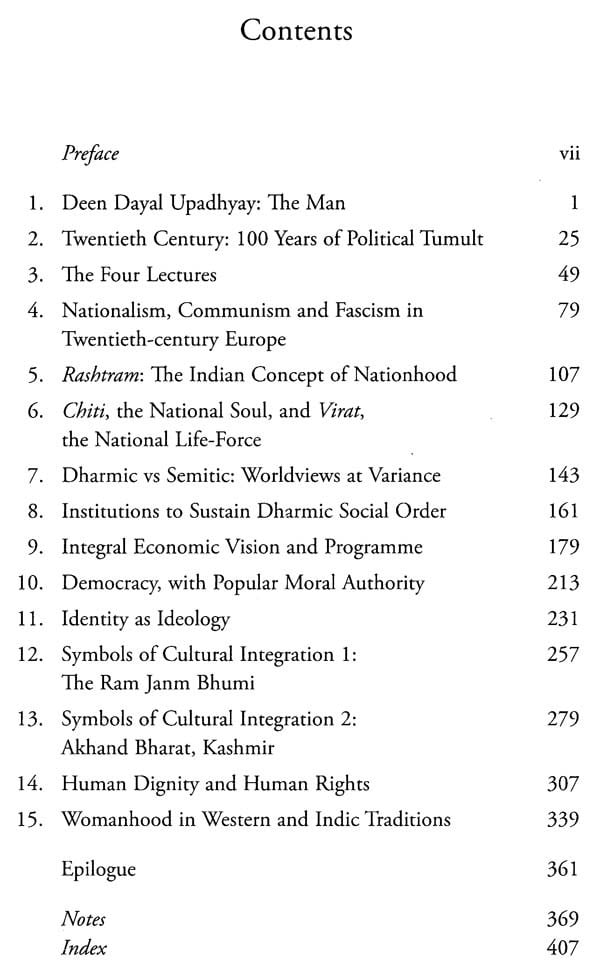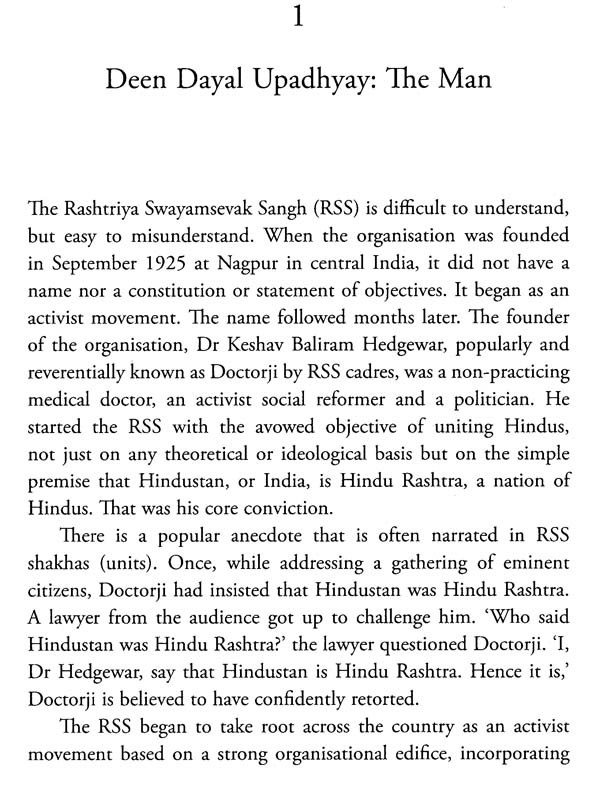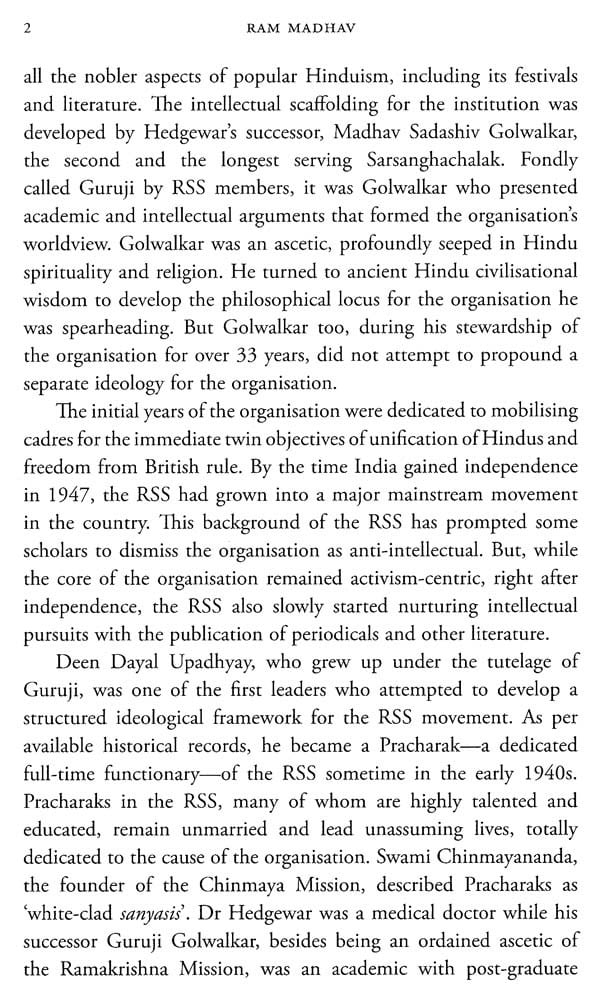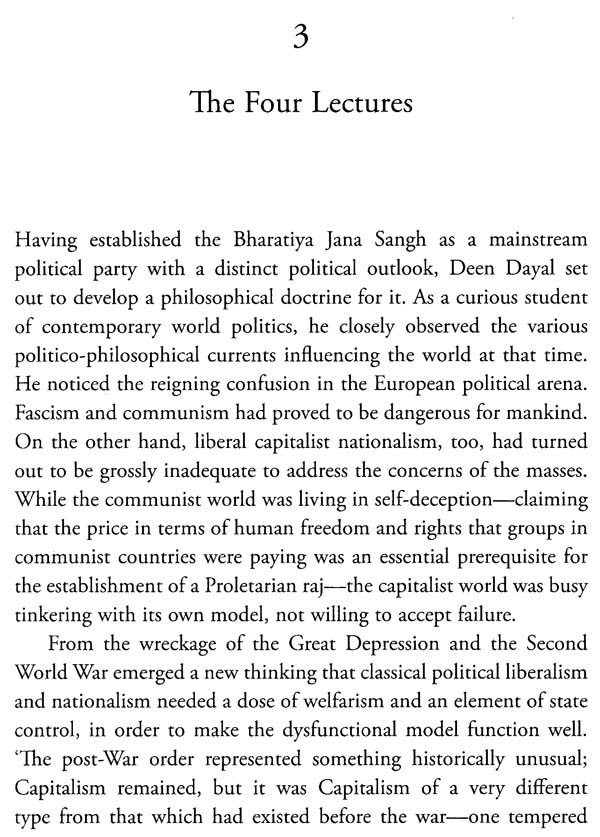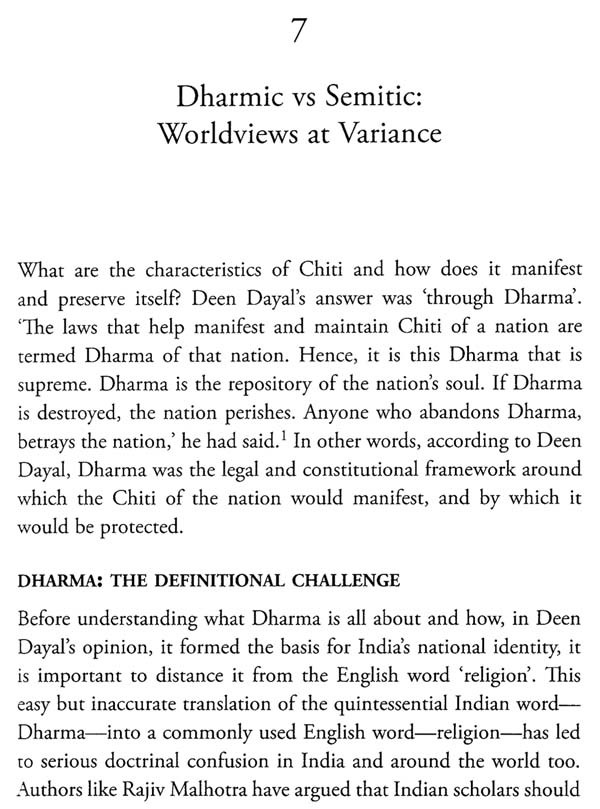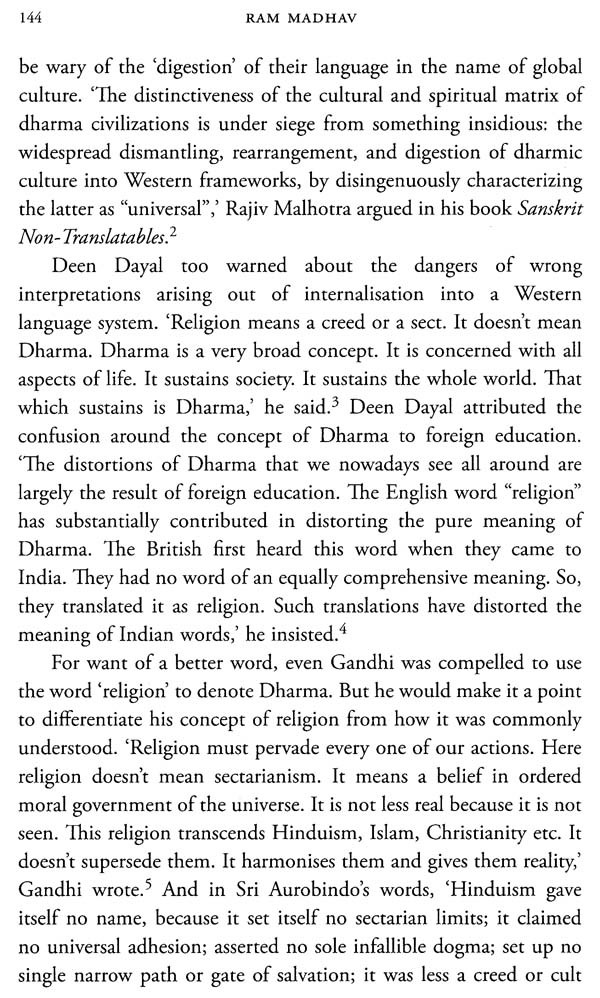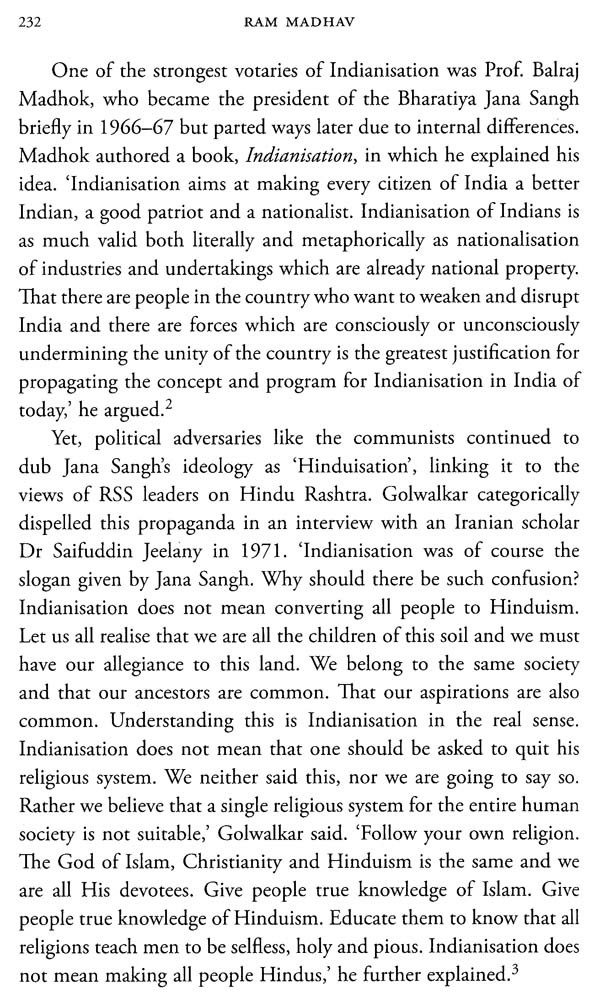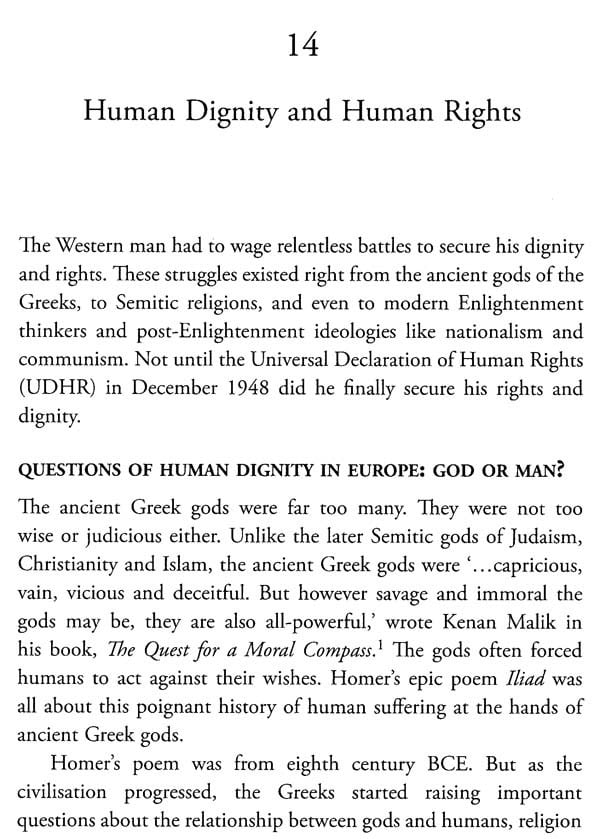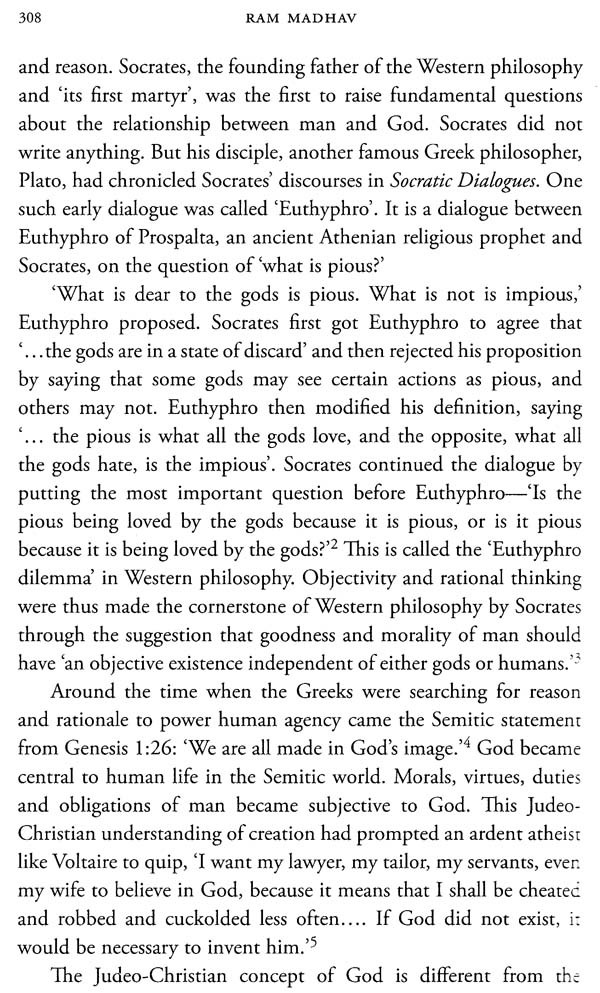
The Hindutva Paradigm
Book Specification
| Item Code: | NCZ032 |
| Author: | Ram Madhav |
| Publisher: | Westland Publications Pvt Ltd., Chennai |
| Language: | English |
| Edition: | 2021 |
| ISBN: | 9789391234089 |
| Pages: | 422 |
| Cover: | HARDCOVER |
| Other Details | 9.00 X 6.00 inches |
| Weight | 550 gm |
Book Description
`All ideologies are idiotic, whether religious or political, for, it is conceptual thinking, the conceptual world, which has so unfortunately divided man,' bemoaned renowned philosopher Master Jiddu Krishnamurti.1 Europe was the mother of ideologies-from the capitalism of Adam Smith to the social conservatism of Thomas Hobbes and John Locke; the liberalism of John Stuart Mill to the communism of Karl Marx. All these ideologies have finally led to the creation of schisms and confusion in the world, as Master JK pointed out. That's why American historian and social thinker Morris Berman had warned, 'An idea is something you have. An ideology is something that has you.'2 India has historically been the land of ideas.
From Vedic times through to those of Mahavira, Buddha, Shankara, Aurobindo, Vivekananda and Gandhi, the great men of India have been philosophers, articulating profound ideas for the welfare of mankind. India has not produced any ideologues like Marx or Mill, neither did it articulate any ideologies. Yet, the deeply philosophical ideas of its sages and savants have continuously inspired and influenced mankind across history and geography. Deen Dayal Upadhyay was one such philosopher. He had articulated the refreshingly stimulating Integral Humanist philosophy. It was not a closed ideology but an open and inclusive idea. More than five decades have passed since its philosophical precis has seen the light of day. The golden jubilee of the Integral Humanism lectures was celebrated in a big way in 2015, and it was followed by the birth centenary of Deen Dayal Upadhyay in 2016-17. However, both the philosophy and the philosopher continue to remain an enigma, not only to the outside world but even to their own followers. Very few can really comprehend Deen Dayal's philosophy and there are even fewer of those who can coherently articulate it. There are a couple of reasons for it. Firstly, Deen Dayal presented his thesis on Integral Humanism through a series of four lectures in 1965 at Bombay (now Mumbai). The thoughts that he presented in those lectures needed further reflection and deliberation to be developed into a comprehensive philosophy. Unfortunately, he did not get enough time to complete that task. He lived for less than three years after he first voiced this philosophy. Secondly, Deen Dayal's followers did not make the effort needed to take forward his core thoughts and give them the shape of a complete political philosophy.
Instead, they were preoccupied by vague theories like Gandhian Socialism for several years, and subsequently settled for the relatively easier formulation of Cultural Nationalism. Some individuals had attempted to explain Integral Humanism through academic theses or political writings. A think tank called Deendayal Research Institute (DRI) was established in the 1980s in Delhi. It encouraged several scholars to work on his thesis. Several publications in the form of books and journal articles followed. When Deen Dayal's birth centenary came up in 2016, some serious-minded scholar politicians, like the former member of parliament (MP) Dr Mahesh Chandra Sharma, devoted long hours to compiling the leader's writings and speeches. A fourteen-volume Complete Works of Deen Dayal Upadhyay was published as the centenary project. All of these efforts are praiseworthy.
My association with Deen Dayal's ideas goes back to my childhood. My father was a senior Jana Sangh leader in Andhra Pradesh and had several interactions with Deen Dayal Upadhyay in that capacity. I saw old pictures of Upadhyay visiting my home. After his demise, one of the first things that my father did, like many other party workers of that period, was to hang a portrait of Deen Dayal in our drawing room. Until the infamous Emergency in 1975, no Jana Sangh function was conducted without garlanding Deen Dayal's portrait. As an RSS functionary from the early 1980s, I had several opportunities to listen to lectures by eminent Sangh leaders on Integral Humanism. Dattopant Thengdi, a senior Sangh leader, had insisted on not using the phrase Integral Humanism, since Hindu philosophy cannot be equated with other 'isms'. Thereafter, the phrase 'Mom Manav Darshan' came into vogue. 'Integral humanist thought' or 'integral humanist philosophy' became its English equivalent. Deen Dayal Upadhyay's birth centenary year gave me the opportunity to deliver a few lectures on his philosophy at different places to different sets of audience. In the process, I was able to refresh my knowledge about the very profound ideas that Deen Dayal had articulated in his treatise five decades ago. Sometime in 2017, my colleague Rajat Sethi came to me with a proposal. Amazon had acquired Chennai-based Westland Publications that year and made it into its Indian publishing arm.
Rajat mentioned to me that they were open to the idea of publishing a book on Deen Dayal Upadhyay and his Integral Humanist philosophy as there was no book on the subject in the mainstream. Moreover, with the rise of Hindutva to the centre stage of Indian national politics, its relevance too has increased. When I signed the contract with Westland in 2018, I assumed that it would be an easy job for someone like me to complete the book in a year's time.
**Content and Sample Pages**
